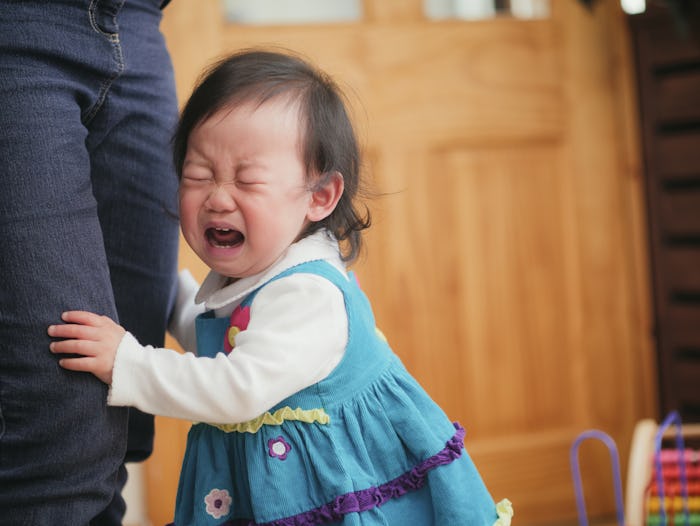Kids are walking, talking balls of emotions, and often times it's difficult to decipher one feeling from another. Are they hungry, or tired? Are they frustrated, or sad? Are they seeking attention, or do they need to be alone? Figuring out what big feeling they're expressing takes time, to be sure, so if you're asking yourself, "Is my child angry?" know that you're not alone.
As a mom, it's easy to assume the worst when you're deciphering your kids' feelings, actions, and how they may impact their futures. I, for one, (and especially as a new mom) obsessed over what my kids were doing and how their responses to the world might clue me in on the kind of people I was raising. But the truth is, kids are kids. Toddlers are going to tantrum, and it doesn't necessarily mean they have some kind of anger problem. Young kids are going to throw toys and spit and sometimes hit, and it doesn't mean they're destined to lash out for the rest of their lives.
Paying attention to your kids' actions is important, to be sure, and if you're at all worried it's always best to speak with a trusted medical care professional. After all, that's what they're there for. But if your kid is doing the following, chances are they're not "angry" in a way that should concern you. They're just being kids.
Your Child Blames Others For Their Actions
What kid isn't going to want to blame, say, the cat for that mess on the floor? Or their sibling for another broken cup? Dr. Gary Oliver, Ph.D., wrote a test for iMom that helps parents rank their child's anger via certain behavioral traits. At the top of the list is blaming other people for their own actions. If your child does this some of the time, but not all of the time, according to Dr. Oliver's test they are experiencing a normal amount of anger.
Your Child Throws Tantrums
According to Understood.org, "most children have occasional tantrums or meltdowns." In fact, according to Kid's Health, tantrums are common in girls and boys ages 1 to 3, and can range in severity. So if your child is kicking and screaming over, say, the "wrong" sippy cup, consider it normal behavior.
Kid's Health does advise that you contact a physician if the tantrums are more frequent, intense, or last longer than normal.
They Lash Out
According to Understood.org, kids "may sometimes lash out if they’re frustrated." A child is going to be feeling a slew of emotions they don't always know how to articulate in a way that is beneficial or helpful, and an irrational lash out ensues. But it's normal, as long as your child isn't lashing out at an age that isn't appropriate (7 or 8, according to Understood.org), and their behavior isn't a danger to themselves or others.
They're Defiant
Name a single human being who isn't defiant at least once in their life, and I'll emphatically call you a liar. Testing boundaries and questioning authority is part of growing up, and is certainly developmental normal for children (especially toddlers, and believe me I know).
They Talk Back
Turns out, talking back is perfectly normal. According to Dr. Sears, "Between seven and 10 years of age, part of the normal development of a child is to protect their interests. They are developing a sense of fairness. Any comment or request from you that is perceived by them as unfair will cause them to naturally go on the defensive."
If your child is young and learning to form their own opinions, chances are they're going to protect them by talking back.
They Fight With Their Siblings
Marian Edelman Borden, author of The Baffled Parent's Guide to Sibling Rivalry, tells Parents, "As kids resolve their disputes, they learn how to compromise and cooperate." So while those sibling squabbles can be annoying (and loud), they're also helping your child learn how to meet in the middle and learn to understand where someone else is coming from. As long as your child isn't hurting their sibling, especially physically, they're not angry — they're just learning.
